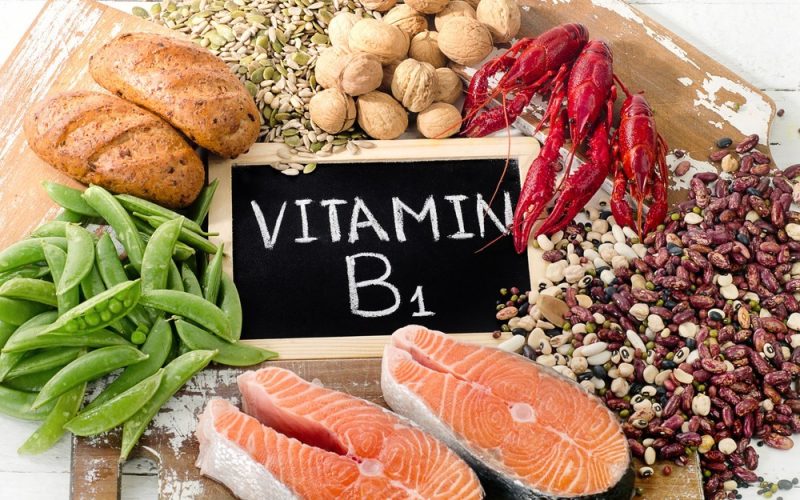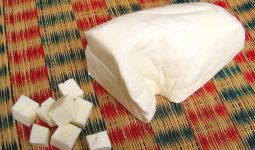Sometimes you may be tempted to ask how many B vitamins exist. This article is not about to answer that question, instead, we will be discussing Vitamin B1, also known as thiamine, or thiamin.
Vitamins are a class of food that most people make a conscious effort to have in every meal. This B1 vitamin enables the body to use carbohydrates as fuel or energy. It is vital for glucose metabolism, and it also plays a vital role in the function of nerve, heart, and muscle function.
Thiamine is a water-soluble vitamin, just as all the vitamins of the B complex.
Vitamins are generally classified according to the materials that they dissolve in. There are some vitamins that dissolve in water, and there are others that dissolve in fat.
Vitamins that are water-soluble are easily carried through the bloodstream. Any extra vitamin B1 the body does not need is eliminated in urine.
Foods
There are very high concentrations of Thiamin in the outer layers and germ of most cereals, as well as in beef, yeast, pork, whole grains, nuts, and pulses.
Fruit and vegetables that you can find vitamin B1 in include liver, cauliflower, oranges, potatoes, eggs, kale, and asparagus.
Other sources of vitamin B1 include blackstrap molasses and brewer’s yeast.
Breakfast cereals and other products that are made with white rice or white flour may be packed full of thiamine.
In the United States of America, people eat about half of their daily vitamin B1 intake from foods that naturally have some thiamin content, while most others come from some foods that are fortified with thiamine.
Cooking, heating, processing foods, and boiling them in clean water, destroys vitamin B1. As thiamine is a water-soluble vitamin, it dissolves easily into the cooking water. If you are cooking white rice that is not fortified, it will contain just one-tenth of the thiamin you can get from brown rice.
It was noted by the National Institutes of Health (NIH) Office of Dietary Supplements (ODS) that a single serving of fortified breakfast cereal gives quote total of 1.5 milligrams (mg) of vitamin B, which is above a hundred percent of your daily recommended amount of thiamine.
A single slice of whole wheat bread packs 0.1 mg or 7 percent of the daily vitamin B1 requirement. Chicken, cheese, and apples do not contain any thiamin.
Humans need a regular supply of thiamine because it is not a vitamin that is stored in the body. It must be a part of our daily diet.
Benefits of thiamine
Vitamin B1, or thiamin, helps to prevent complications in the brains, nervous system, stomach, muscles, heart, and intestines. Vitamin B1 is also involved in the flow of electrolytes in and out of the nerve cells and muscle.
It greatly helps with the prevention of diseases like beriberi, which involves disorders of the nerves, heart, and digestive system.
Uses of vitamin B1 in medicine
There are some patients who may need to receive thiamine for the treatment of certain conditions.
People who may have low levels of vitamin B1 include individuals with peripheral neuritis. This is an inflammation of the nerves that are on the outside of the brain or the pellagra.
People who have persistent diarrhoea, ulcerative colitis, and poor appetite may also receive vitamin B1. People who are in a coma may be given vitamin B1 injections.
There are some athletes that use thiamin to help improve their activeness. It is not a prohibited substance for people who workout and athletes in the United States.
Other conditions in which vitamin B1 supplements may be used include:
- Canker sores
- AIDS
- Cataracts
- Cerebellar syndrome, a type of brain damage
- Glaucoma and other vision problems
- Diabetic pain
- Cervical cancer
- Heart disease
- Stress
- Motion sickness
- Kidney disease in patients who have diabetes type 2
- A weakened immune system.
Please note that not all of the above uses have been confirmed by studies.
Deficiency symptoms
A deficiency of thiamine commonly leads to beriberi, which is a condition that features problems like challenges with the peripheral nerves and wasting.
Anorexia and weight loss can develop.
There may be some mental problems, such as confusion and short-term memory loss.
People who lack thiamine may experience weakening of the muscles and cardiovascular symptoms such as an enlarged heart.
How much vitamin B1 does your body need?
In the United States, the recommended daily allowance (RDA) of thiamin that should be taken by mouth is 1.1 mg for females and 1.2 mg for males who are over the age of 18 years.
For pregnant or breastfeeding females of any age, they are required to consume 1.4 mg each day.
Who is at risk of a B1 deficiency?
Individuals with poor diet, “morning sickness” during pregnancy, cancer, bariatric surgery, and those who experience hemodialysis are at a high risk of thiamin deficiency.
Those who drink alcohol regularly to an excess may suffer a deficiency, as they may find it impossible to absorb thiamin from the food they eat.
The wernicke-korsakoff syndrome is one dangerous disorder that often affects people who are chronic alcoholics. It is connected to a lack of thiamin, and if not treated, it can be fatal.
Individuals with Wernicke-Korsakoff syndrome and people who are withdrawing from alcohol use may be given some vitamin B1 injections to help them recover better and faster.
There are other diseases that can hinder the absorption of vitamin B. An example of such disease is HIV, and this lack of absorption can lead to a deficiency of thiamine.
Functions of vitamin B1
All of the B vitamins are water-soluble. These vitamins greatly help to convert fats, carbohydrates, and protein into glucose or energy.
B vitamins are impossible for keeping the skin, liver, hair, and eyes healthy. Thiamine also plays an important role in the nervous system ( which is basically one of the engines that keep the body running) and they are needed for proper brain function.
The B vitamins are super vitamins and are sometimes referred to as the anti-stress vitamins, because of their ability to boost the body’s immune system when we are stressed.
Side effects of vitamin B1
Evidence is yet to confirm any harm that can be done from consuming too much vitamin B1, but the United States Food and Drug Administration (FDA) has warned on the use of supplements.
They implore people to check with their doctors or health care provider before going ahead to use any supplements with or as a substitute for any foods.
They also call on the public to talk to a physician and seek advice on ways to improve their health, instead than self-diagnosing and self-meditation.
Interactions of thiamine
A cup of tea or coffee are the most common ways we start our day. However, these two contain tannins, which are chemicals that are likely to interact with thiamin, making it more difficult to absorb.
Some of the chemicals in fish and raw shellfish and can destroy vitamin B1, and that can potentially lead to a deficiency if consumed in large quantities. Processing or cooking usually destroys these chemicals, but that is also a way to destroy thiamin.
Have you ever lacked vitamin B1, or do you have any details you’d like to share with us? please, do not hesitate to leave a comment in the comments section provided below. We look forward to hearing from you.








